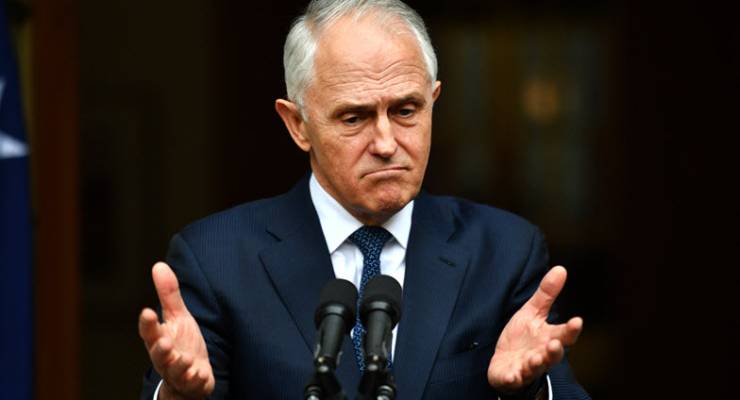
And that is called paying the Dane-geld;
But we’ve proved it again and again,
That if once you have paid him the Dane-geld
You never get rid of the Dane.
So wrote talented poet and committed racist Rudyard Kipling, advising nations against giving in to blackmail, in 1911. Our most recently former prime minister Malcolm Turnbull may have reflected on those lines in the last week. How did it go so wrong?
Minister for International Development, Senator Concetta Fierravanti-Wells put forward a theory in her letter of resignation: the party was moving too far to the left, eroding its conservative base.
Let’s see how that analysis stacks up.
Marriage equality
The most curious assertion in Fierravanti-Wells’ missive was that the marriage equality debate had eroded the conservative base. Presumably her complaint is that the result went the way it did and Turnbull didn’t ignore it? The imposition of an opt-in non-binding survey of public opinion was entirely a concoction of the right wing of the Liberal Party (designed by Tony Abbott and initially championed by Peter Dutton). After a lengthy, costly, at times violent and hateful campaign, the vote confirmed what we already knew — that most people in Australia want same sex marriage to be allowed.
Meanwhile, the conservative bete noire, the Safe Schools anti-bullying program, was also scrapped under Turnbull’s watch.
Energy policy
Ah, the NEG, perhaps the defining Turnbullism. It was supposed to be a crowning achievement, a legacy. The man who famously stated he would “not lead a party that is not as committed to effective action on climate change as I am” had finally delivered an actual energy policy in Australia. A watered down, ineffective policy, but a policy nonetheless. As he announced at the time:
My government is committed to cheaper, reliable electricity. That is what the NEG will deliver. It’s been endorsed by the party room already and it will be endorsed again. It’s got absolutely overwhelming support.
Within a week, that overwhelming support had dissolved into dust, at the behest of the right wing of his parties.
Super ministry
In July last year, the greatest concentration of power any individual minister in Australia was delivered to Peter Dutton, combining power over Border Force, ASIO, the Australian Federal Police, the Australian Criminal Intelligence Commission, the Australian Transaction Reports and Analysis Centre, and the Office of Transport Security.
Race-baiting
Turnbull often returns to the refrain that “Australia is the most successful multicultural country in the world”. Yet in July, after weeks of News Corp beat-ups over “Sudanese gangs” in Victoria (parroted by Peter Dutton) Turnbull himself jumped in to contribute to the outrage:
There is certainly concern about street crime in Melbourne. There is real concern about Sudanese gangs, I’ve heard people, colleagues from Melbourne say there is real anxiety about crime in Melbourne. You’d have to be walking around with your hands over your ears in Melbourne not to hear it.
At every turn, Turnbull cowed to the right of his party in general and Peter Dutton in particular. It was not enough. It was never going to be enough.
We’re sure we’ve missed a few of Turnbull’s capitulations — let us know.








One gifted liar gone, but replaced by two more who lack his gift for guile, but make up for that with bullish determination.
One of his earliest and most enduring sell-outs must surely be the “copper from node” demolition of the NBN network; a decision which made no sense whatsoever in any world other than the weird twilight one inhabited by the demented far right.
You could have included keeping Manus & Nauru open.
The repeated cuts to the aid program were pretty clearly against his closet ally Julie Bishop wishes and pandered to Concetta Fierravanti Wells disdain for her own ministry.
Consorting with the Greens to change the Senate rules to allow in more RWNJ whilst tarting it up as Senate reform. Then pulling the chain.
Before the election the story was that the changes would stop minor parties, afterwards they were somehow responsible for them.
Can you give any explanation as to why eliminating group voting tickets advantages right wing parties? And if so why did Labor do it in the NSW and SA parliaments?
Under group voting tickets there were numerous examples of preferences going to right wing parties from others – most notably Labor preferences electing Steven Fielding. After the changes, voters control their own preferences. Right wing candidates such as One Nation got elected because people chose to vote for them, not because of the system.
The new system more accurately reflects what voters actually choose, and removed backroom deals from determining the outcome, and this is why most experts, particularly Antony Green and Kevin Bonham, wrote in favour of abolishing group voting tickets. I particularly recommend Bonham’s comprehensive review of the results of the voting reforms here http://kevinbonham.blogspot.com/2016/08/senate-reform-performance-review-part-1.html